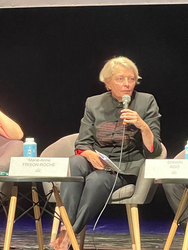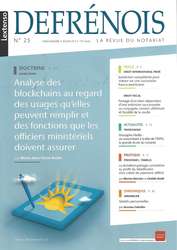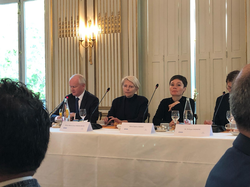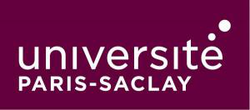June 19, 2023
Conferences

♾️ follow Marie-Anne Frison-Roche sur LinkedIn
♾️subscribe to the Newsletter MAFR Regulation, Compliance, Law
____
► Full Reference: M.-A. Frison-Roche, participation in the panel "Vigilance (due diligence)", in International Law Association (ILA), 150th Anniversary Symposium of the ILA/ADI, Paris, 19 June 2023.
____
🧮See the full programme of this event
________

April 25, 2023
Publications

🌐follow Marie-Anne Frison-Roche on LinkedIn
🌐subscribe to the Newsletter MAFR Regulation, Compliance, Law
____
 ► Full Reference: M.-A. Frison-Roche, The role of the Judge in the deployment of Regulatory Law through Compliance Law, Working Paper, April 2023.
► Full Reference: M.-A. Frison-Roche, The role of the Judge in the deployment of Regulatory Law through Compliance Law, Working Paper, April 2023.
____
🎤 This working paper was drawn up to serve as the basis for the concluding summary session of the colloquium organised by the Conseil d'Etat (French Administrative Supreme Court) and the Cour de cassation (French Judicial Supreme Court), De la régulation à la compliance: quel rôle pour le juge? ("From Regulation to Compliance: what role for the Judge?") held on 2 June 2023 at the Conseil d'Etat.
____
📝 This working paper also served as the basis for the article that concludes the book De la régulation à la compliance : quel rôle pour le juge, published by the La Documentation Française, 2024.
____
► Working Paper Summary: It is remarkable to note the unity of conception and practice between professionals who tend to work in administrative jurisdictions and professionals who tend to work in judicial jurisdictions: they all note, in similar terms, an essential movement: what Regulatory Law is, how it has been transformed into Compliance Law, and how in one and even more so in the other the Judge is at the centre of it. Judges, as well as regulators and European officials, explain this and use different examples to illustrate the profound transformation this has brought about for the law and for the companies responsible for increasing the systemic effectiveness of the rules through the practice and dissemination of a culture of compliance. The role of the judge participating in this Ex Ante transformation is renewed, whether he is a public law judge or a private law judge, in a greater unity of the legal system.
____
🔓read the Working Paper below⤵️
Sept. 28, 2020
Thesaurus : 09. Juridictions étrangères
Full reference: Westminster Magistrates' Court, 28th of September 2020, Uber London Limited v. Transport for London
Read Marie-Anne Frison-Roche's commentary in the Newsletter MAFR - Law, Regulation & Compliance
June 20, 2019
Publications

Référence complète : Frison-Roche, M.-A., Analyse des blockchains au regard des usages qu'elles peuvent remplir et des fonctions que les officiers ministériels doivent assurer, in Revue Défrenois, Lextenso, n°25, 20 juin 2019, pp. 23-29.
Résumé : La blockchain est une technologie qui n'est pas, en soir, bonne ou mauvaise. Elle est plus ou moins adaptée aux fonctions qu'elle est apte à remplir. Ce qu'il faut ensuite confronter aux fonctions que l'État a dévolues aux officiers ministériels. Or, autant les fonctions de conservation et de duplication des actes gagnent à être transférées et développées dans cette technologie, autant la fonction d'élaboration des instrumentums ne peut être assumée que par des officiers ministériels auxquels l'État demande de vérifier la correspondance entre les mentions des instrumentums et la réalité des négotiums, ce que seuls des êtres humains peuvent mener et ce qu'aucune machine ne peut faire.

Updated: May 27, 2019 (Initial publication: May 13, 2019)
Publications

First of all, this working document was used as a support for an oral intervention done in French on the general topic. L'officier ministèriel est-il soluble dans la blockchain ? (Is the ministerial officer soluble in the blockchain?) at the "Club du Droit", which took place at the Conseil supérieur du Notariat on May 14, 2019, in Pars.
Consult the general presentation of the conference (in French).
Then it serves as a basis for an article to be published in the Revue Defrénois (in French).
______
Introduction & Summary.
The technical analysis of the confrontation between the tool that is the blockchain and the function that ensure these particular people who are the "ministerial officers"
For this, it is necessary to keep in mind this distinction so simple: the blockchain is a tool, a thing, a machine, an algorithm, a mechanical, mathematical power, while the ministerial officer is a human being.
This refers to the distinction that the Western legal system, whether Civil Law or Common Law, poses as summa divisio: the distinction between human beings and things. This first distinction is formulated so that we do not treat human beings as things, since they are legally qualified as "person"
For this essential distinction to remain effective, not only should we not imagine human beings as things (reduced to their bodies, for example, or reduced to mechanical acts of consumption
But technology represents more and more things with anthromophormi forms and reactions , through robots which "speak", "intelligent" machines, etc. The economic success of promoters of machines and other human-like robots, mechanical solutions presented as "intelligent", is based on forgetting the distinction between the person and things. It is certainly possible to erase this distinction from our system of thought. The difficulty is that it is the basis of Western Lawl
It is this background that is played in the practical questiond of insertion of blockchains and other technologies and the way in which the various professions must exercise their functions today. If these tools are consistent with these functions, or even improve them, professionals must welcome them without suspicion, or even participate directly in developing them. If these tools are not capable of fulfilling certain functions entrusted to these professionals, then these functions must not be inadvertently or maliciously inserted into a blockchain, whose capacity for preservation and reliability does not amount to anything, because a thing doesn't have any ability to think.
This is why we must start from the functions, by dinstinguising the technical function of conservation, duplication and elaboration of acts (I).
It seems that assuming the technical reliability of preservation and duplication acquired through the blockchain, as soon as there is a part of elaboration in the act, human intervention must step in because a machine is unfit to check the facts. Here we find the distinction between the retranscribed negotium, this retranscription never being mechanical, and the instrumentum itself, which, split from what gave rise to it, can be subjected to duplicative and conservation technologies. These technologies of conservation and duplication could be so efficient that the notions of original and copy could be questioned because of the reliability of the blockchain (II).
Thus the blockain is an effective technology on the instrumentum as documents divided from the negotium, but it can not guarantee the correspondence between the two ; it has only the reliability in the conservation, the availability and the duplication to infinity of the instrumentum, of what is extremely useful, and justifies that ministerial officers incorporate this technology. But the function of these are not limited to being agents of conservation and duplicators. We do not simply move from the copyist monk to the blockchain. The main and so precious function of the ministerial officers is to check the accuracy of the mentions of the instrumentum in relation to the reality of the negotium. This is so precious for a market economy to have this correspondance
This would be the choice of a very liquid and unsecured market (without intermediary, with the benefit of lower cost in Ex Ante and higher risk for the long term). In policy, the balance is always between security and liquidity, especillay in financial systemic policy. This was done by American Law, wich prefered low costs and high liquidity, especially for real estate loans, which were securitized by subprime mortgages. For the moment, this choice is not made in this sense by European Law, safety concern in the elaboration of the acts being preferred and the distinction between the human aptitude and the mechanical aptitude remaining. And we know that in the first system the reajustment takes the form of a general crisis, which reinjects the reality of the negotiums, lost in the instrumentums. What price are we ready to pay ?
Once this distinction is clearly made, because the elaboration of an acte mus be made bye the ministerial officer, human being invested by the State of the particular charge ensures the accuracy of the mentions of the act with the reality of people, wills, obligations and goods, it is all the more expedient for ministerial officiers to organize themselves to develop blockchain technology. Indeed, once this act has been developed reliably, ans as such deserves to be "authentic", because of the continuum between elaboration, preservation and duplication, because it is up to the ministerial officiers to draw up the deeds more incontestably reliable. It is up to them to equip themselves with the technological means of best conservation and duplication of acts elabored by them (IV).
Sur la confrontation déjà faite dans l'analyse économique de la "régulation" et la fonction notariale, v. Frison-Roche, M.-A., ....
Frison-Roche, M.A., Pour protéger les êtres humains, la nécessité éthique de la notion juridique de personne, 2018.
Anders, G., notamment dans son ouvrage central L'obsolescence de l'homme (1956), présentant l'être humain réduit à l'état de "machine désirante" par une société de pure et simple consommation. Le souci qu'il en a comme philosophe rejoint le souci qu'en avait Jacque Ellul, comme juriste, s'inquiétant de la "société technicienne" (...). Or, les machines correspondent aujourd'hui au dessin que ces auteurs du milieu du XXième siècle en faisaient. De la même façon, Alain Supiot rapporte à Kafka le souci du "machinisme" dans le fonctionnement des institutions humaines (....) ; il ne fait notamment dans son analyse de Kafka comme "artiste de la Loi" (2019).
Par exemple Supiot, A., La gouvernance par les nombres, 2015 ; Mondialisation ou globalisation ? Les leçons de Simone Weil, 2019 ; Le droit au XXIème siècle : droit, technique et écoumène (dernière leçon au Collège de France, 22 mai 2019).
Sur cette idée folle et dévastatrice qu'il faut faire davantage confiance aux machines qu'il ne faut faire confiance aux êtres humains, ce qui justifierait donc de "mécaniser" les autres humains, idée folle reprise le plus souvent par les auteurs avec entrain, v. par ex. Caprioli, E.A., La blockchain ou la confiance dans la technologie, JCP 2016. 672, n° 3.
Frison-Roche, M.-A., La disparition de la distinction de jure entre la personne et les choses : gain fabuleux, gain catastrophique, 2017.
Frison-Roche, M.-A., L'acte authentique, acte de marché, 2010.
May 14, 2019
Conferences

Référence complète : Frison-Roche, M.-A., participation à la table-ronde L'officier public ministériel est-il soluble dans la blockchain?, conférence-débat organisée par Le Club du Droit & le Conseil supérieur du Notariat, 14 mai 2019, Paris.
Consulter la présentation générale du colloque.
Consulter le document de travail sur la base duquel l'intervention a été faite.
Lire le compte-rendu qui en a été fait dans la presse.
Dans cette table-ronde, un professeur d'économie expose la dimension technologique et économique de la blockchain.
Puis est abordée la dimension juridique, dont l'exposé m'était plus particulièrement confié.
_____
A ce titre, après avoir replacé la question technique dans ce que doit garder le Droit, à savoir la distinction entre la Personne et les choses, ce que la technologie présentée aujourd'hui comme un ensemble de choses "intelligentes" et "décidantes" remettant en cause...., l'intervention porte sur 4 points (qui sont développés dans le document de travail).
En premier lieu, avant de porter une appréciation sur ce qui est adéquat et sur l'avenir il faut distinguer les fonctions techniques de conservation des actes, de duplication des actes et d'élaboration des actes, la distinction entre negotium et instrumentum n'étant en rien effacée par la technologie des blockchains.
En deuxième lieu, dès l'instant qu'il y a une altération substantielle de l'acte instrumentaire parce qu'un nouveau negotium a eu lieu, parce que les mentions doivent mesurer la reproduction de la réalité de ce qui fut décidé par les parties, l'on n'est plus dans l'acte de conserver et de dupliquer à l'identique, mais dans l'acte d'élaboration. Or, dans l'acte de conservation et de duplication, la blockchain peut être un atout technologique très précieux, en ce qu'à supposer sa fiabilité acquise, l'erreur étant exclue, c'est comme si l'on pouvait produire des originaux indéfiniment. La fiabilité est telle que la distinction entre original et copie n'aurait plus lieu d'être. Mais pour l'élaboration de l'instrumentum au regard du negotium , comment une machine pourrait-elle "dresser" un acte, c'est-à-dire en vérifier son rapport d'exactitude par rapport à la réalité ? Elle ne le peut pas. Seul un être humain le met, l'Etat ayant "déconcentré" son pouvoir de dresser uniléralement des actes (en cela, les notaires sont issus de la même idée de déconcentration....) en exigeant qu'ils vérifient la conformité à la réalité pour que l'incontestabilité soit ensuite attachée aux mentions.
En troisième lieu, il apparaît alors que la blockain est un outil de conservation et de duplication, mais que l'intermédiation d'un tiers de confiance humain vérifiant l'exactitude des mentions est nécessaire si l'on veut par sécurité que ce qui est dit dans l'acte écrit, puis conservé, puis dupliqué, soit la reproduction de la réalité. S'opère alors un choix de politique économique, souvent lié à la culture des pays. L'on peut considérer que le coût de l'intermédiation est élevé et qu'il faut mieux assumer le risque de l'inexactitude des mentions (quant aux parties, à la réalité de leur consentement, à la consistance de l'objet, à l'ampleur des obligations, etc.) et s'assurer ainsi un marché liquide. Le réajustement des actes par rapport à la réalité des choses se fait alors par la crise, qui réinjecte l'information, l'exemple en étant la crise des prêts immobiliers financiarisés des subprimes. C'est le choix anglais et américains. L'on peut préférer la sécurité par l'intermédiation en ralentissant le marché. C'est le choix du droit romano-germanique. Ces options demeurent ouvertes. La technologie du blockchain n'interfère pas, parce qu'elle ne doit pas viser l'établissement des actes. Si elle devait la viser, alors on aurait choisi la liquidité à la sécurité. Ou en termes plus généraux, l'on aurait choisi la Concurrence contre la Régulation. Mais plus que jamais le souci Ex Ante des risques systémiques (et le fossé entre la réalité et les actes qui doivent la transcrire est un risque systémique majeur) est premier.
En quatrième lieu, en ayant ainsi un tableau des fonctionnalités, l'on voit que les notaires peuvent avoir grand usage des blockchains. Sans laisser des machines établir des actes, ils peuvent les utiliser comme le furent des coffreforts et des photocopieuses, avec une fiabilité et une mise en commun que seul le numérique et la capacité de calcul peuvent offrir à travers cette nouvelle technologie. Plus encore, l'articulation de l'amont (élaboration) et de l'aval (conservation et duplication) étant de nouveau reconnue comme la plus efficace, les officiels ministériels sont les mieux placés, en tant qu'ils dressent des actes instrumentaires dont ils ont vérifié les mentions et après avoir conseillé les parties, à conserver et à dupliquer ceux-ci.
_____

Nov. 15, 2017
Teachings : Participation à des jurys de thèses

Référence : Frison-Roche, M.-A., membre du jury de la thèse de Cédric Paulin ,Vers une politique publique de la sécurité privée ? Réguler la sécurité privée (1983 - 2014), Université Versailles-Saint-Quentin , 15 novembre 2017, 650 pages.
Autres membres du jury : Patrick Hassenteufel, Jacques Maillard, Massimilliano Mulone, Frédéric Ocqueteau ,Yves Surel.
Au terme de la soutenance, le candidat a obtenu le grade de docteur en sciences politiques (les mentions ont été supprimées).
Sept. 6, 2014
Blog
 L'arrêt rendu par la Cour de justice de l'Union européenne (CJUE) du 4 septembre 2014,Germanwings , illustre parfaitement ce qu'est la méthode juridique.
L'arrêt rendu par la Cour de justice de l'Union européenne (CJUE) du 4 septembre 2014,Germanwings , illustre parfaitement ce qu'est la méthode juridique.
La qualification est l'exercice juridique par excellence. C'est en elle que réside le véritable pouvoir du droit.
Elle consiste à faire entrer un fait dans une catégorie juridique afin de lui appliquer le régime juridique attaché à cette catégorie juridique. Ainsi, suivant que le fait est "subsumé" dans cette catégorie ou ne l'est pas, le régime lui sera appliqué ou non.
Par exemple, si l'on considère qu'un voyageur est "arrivé" plus ou moins tard dans le long processus de l'atterrissage de l'avion et de son débarquement, cela sera plus ou moins profitable pour la compagnie aérienne. En effet, celle-ci doit une compensation financière au voyageur victime d'un "retard". Encore faut-il connaître son "heure d'arrivée". Encore faut-il déterminer juridiquement ce qu'est le fait pour un voyage d'"arriver".
Pour limiter les cas de compensation, les compagnies aériennes ont fixé contractuellement le moment d'arrivée des voyageurs, à l'instant où l'appareil touche le sol, ce qui réduit les hypothèses de retard et donc le nombre de fois où elles devront de l'argent. Mais le pouvoir des parties à manier les qualifications a des limites.
C'est le juge qui fixe ces limites, exemple du conflit permanent entre le pouvoir des contractants, ici bien inégaux (compagnies aériennes versus passagers) et le pouvoir du juge. En effet, la Cour de justice de l'Union européenne, dans son arrêt du 4 septembre 2014, Germanwings, affirme que le contrat ne peut définir d'autorité ce qu'est une "arrivée". Elle opère elle-même cette opération, et le fait au regard du droit du passager à obtenir compensation pour cause de regard.
Ainsi la volonté contractuelle ne peut pas tout, surtout lorsqu'une partie (compagnie aérienne) est beaucoup plus puissante que l'autre (passager). Le juge écarte cette volonté pour analyser la réalité des choses, en se souciant avant tout de la personne faible, ici le passager.
July 27, 2014
Blog
phone usage in relation to the planes both air traffic control and telecommunications regulation: it is a case of interregulation .
French telecoms regulator, the ARCEP , consequently authorizes companies to operate the phones. But it reflects the need for security, limiting available bandwidth those that are not used by pilots.
Case technically successful interregulation , and it is likely that the re air regulator will therefore abandon its ban.
Updated: July 31, 2013 (Initial publication: Sept. 20, 2011)
Teachings : Les Grandes Questions du Droit, semestre d'automne 2011

Feb. 14, 2006
Publications

Référence complète : FRISON-ROCHE, Marie-Anne, Indépendance des juges et sécurité des personnes, D.2006, tribune, p.2745.
Feb. 3, 1998
Thesaurus : Doctrine